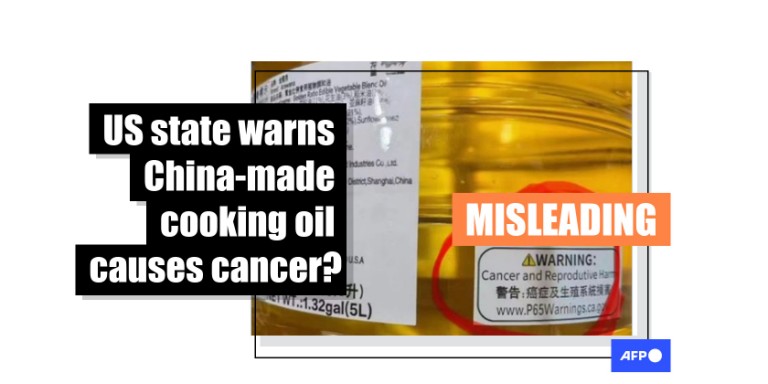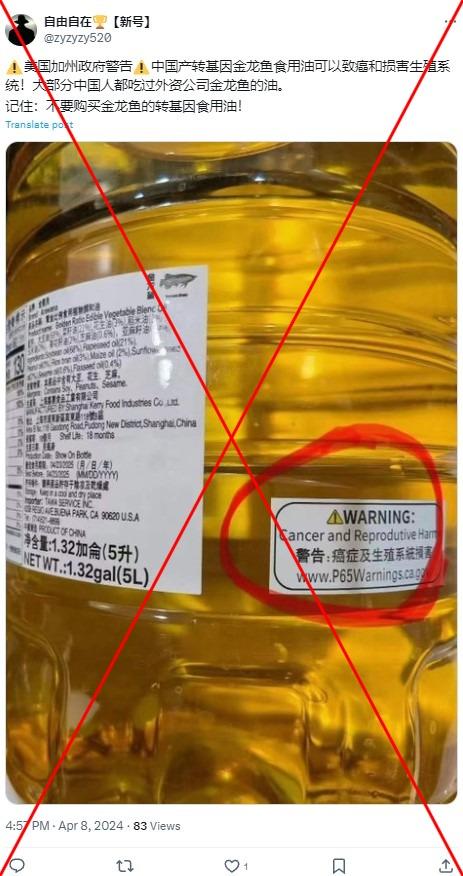
Californian authorities rebuff misleading online posts about Chinese cooking oil
- This article is more than one year old.
- Published on May 21, 2024 at 08:38
- 3 min read
- By Carina CHENG, AFP Hong Kong
"Warning from the United States' California government: Made-in-China, genetically modified Arawana cooking oil can cause cancer and damage the reproductive system!" read the simplified Chinese caption of an X post on April 8, 2024.
It went on to urge people not to buy the product made by Yihai Kerry Arawana, a China-based food and agriculture company.
The accompanying photo appears to show an Arawana cooking oil product featuring a warning label with the text "Cancer and Reproductive Harm" written in both English and Chinese before the website address "www.P65Warnings.ca.gov".
It lead to the California state government's official website for "Proposition 65", formally known as the Safe Drinking Water and Toxic Enforcement Act of 1986 (archived link).

The Chinese cooking oil giant has previously been embroiled in controversy over its use of GMO in its products -- a group of lawyers had filed a civil suit against Yihai Kerry Arawana over unclear labelling of its GMO products in 2014 (archived link).
However, the China National Food Industry Association said its labels complied with regulations.
The same image was shared alongside a similar misleading claim elsewhere on X here and here; on Facebook here and here; and YouTube here.
The warning label highlighted in the posts is issued to comply with a California state law called Proposition 65 that requires businesses to inform consumers about significant exposures to chemicals that cause cancer, birth defects or other reproductive harm.
The regulations do not include rules on the labelling of genetically modified products.
In response to the misleading posts, Amy Gilson from the California Environmental Protection Agency's Office of Environmental Health Hazard Assessment (OEHHA), said it appeared the oil had been given a warning label because it contains lead, not genetically modified products.
"A Proposition 65 warning does not mean a product causes imminent danger or is in violation of any product safety standards," she said.
"Warnings often advise consumers of low-level exposures that are unlikely to cause harm by occasionally using that one product, but that can contribute to the consumer’s overall lifetime risk of cancer or overall risk of harm to a developing baby."
She went on to say that the warning labels "were not uncommon in California".
"Many consumers who make a general practice of minimizing their exposures to toxic chemicals use the warnings as one piece of information in guiding their purchasing decisions," she said.
In a statement on April 8, Yihai Kerry Arawana said the warning label was added to its products exported to California to comply with local laws.
"Our company's products meet the requirements of both the United States Food and Drug Administration (FDA) and Chinese food safety standards", it said (archived link).
Genetically modified products
Scientists told AFP there is no evidence genetically modified products can cause cancer or reproductive damage.
"In terms of safety, oils derived from GM plants are generally considered safe because the refining process removes any potential harmful substances," Swinburne University of Technology nutrition researcher Jimmy Louie told AFP on May 10 (archived link).
University of Hong Kong biologist Hani El-Nezami also said there were "no studies" highlighting the possibility of GMOs causing cancer or damage to reproductive systems and "no evidence" linking GMO consumption to cancer (archived link).
The United States FDA assures consumers that GMO crops "are not changed in ways that would increase the risk of cancer for the humans or animals that eat them" and any long-term health effects of eating such plants would be no different from consuming foods from traditionally bred plants (archived links here and here).
Copyright © AFP 2017-2026. Any commercial use of this content requires a subscription. Click here to find out more.
Is there content that you would like AFP to fact-check? Get in touch.
Contact us
